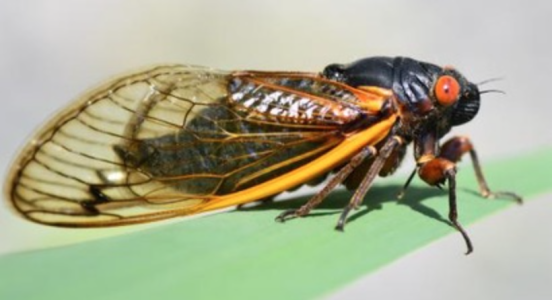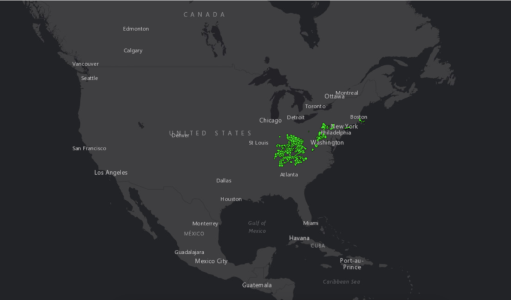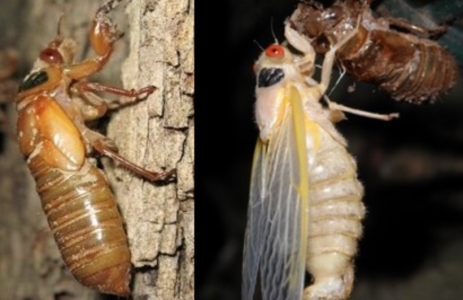Brace yourself: Alien-like insect set to invade 13 states after 17 Years!
By
Aubrey Razon
- Replies 0
After 17 years underground, billions of cicadas are about to emerge in a spectacular natural event. This year, 13 states will witness these "alien-like" insects in action, filling the air with their unique sound.
Are you ready for this once-in-a-lifetime invasion?
As the days grow longer and the soil warms, a remarkable natural phenomenon is poised to unfold across the eastern and central United States.
After a 17-year slumber, billions of Brood XIV cicadas are preparing to emerge from their subterranean hideaways and take to the skies in a spectacular display of nature's resilience and wonder.

The states bracing for the cicada emergence include:

The timing of their arrival is somewhat unpredictable, but these creatures are nothing if not punctual in their own way, typically surfacing when the ground temperature reaches a consistent 64°F—often between April and June.
The male cicadas are the musicians of this natural orchestra, producing a high-pitched buzzing designed to attract females that can rival the volume of a lawn mower.
This sound is so pervasive that in previous years, it has led to calls to law enforcement from concerned citizens mistaking the noise for alarms or other disturbances.
The Newberry County Sheriff's Office in South Carolina even had to issue a public statement to reassure residents that the sounds were a natural part of spring.
While some may find the cicadas' chorus annoying, it's important to recognize the significant ecological benefits these insects bring.
As the US Environmental Protection Agency (EPA) notes, cicadas serve as a valuable food source for birds and other wildlife.
Moreover, the burrowing activity of cicada nymphs helps to aerate the soil and improve water filtration, contributing to a healthier ecosystem.
Periodical cicadas, like those of Brood XIV, are distinct from their annual cousins.
They have black bodies, striking red eyes, and emerge en masse every 13 or 17 years.
Brood XIV, which is set to emerge this year, is particularly noteworthy for its size—these insects can reach about two inches in length.
Once they emerge, cicadas live a fast-paced life above ground for four to six weeks.
During this time, they mate, lay eggs, and then disappear as suddenly as they arrived.
Despite their intimidating appearance and the din they create, cicadas are relatively harmless to humans and pets.
According to Saad Bhamla, a professor at Georgia Tech College of Engineering, the most these insects do is climb trees and excrete a liquid that is mostly water, causing no real harm.
Last year's emergence was particularly intense, with an estimated one trillion cicadas participating in what was dubbed the cicada “apocalypse”.
This event marked the first time since the 19th century that two different broods emerged simultaneously, a rare occurrence that Dr. Gene Kritsky, an entomologist and cicada expert, described it as a once or twice in a lifetime event.
Cicadas are intriguing not only for their long developmental cycle but also for their ability to transform.
After emerging, they undergo a process of hardening their exoskeletons, which takes about five days, shedding their old exterior to begin their brief life of flight.
As we anticipate the arrival of Brood XIV, it's an opportunity to marvel at one of nature's most curious and awe-inspiring cycles.
For those living in the affected states, it's a time to prepare for the noise and embrace the ecological benefits these insects bring.
Whether you find them fascinating or a bit of a nuisance, one thing is certain: the cicadas are coming, and they will be impossible to ignore.

Have you experienced a cicada emergence before? What are your thoughts on this natural event? Share your stories and tips for coexisting with these remarkable insects in the comments below.
Are you ready for this once-in-a-lifetime invasion?
As the days grow longer and the soil warms, a remarkable natural phenomenon is poised to unfold across the eastern and central United States.
After a 17-year slumber, billions of Brood XIV cicadas are preparing to emerge from their subterranean hideaways and take to the skies in a spectacular display of nature's resilience and wonder.

Although their presence can be annoying, cicadas are harmless to humans and pets. Image source: Cicadamania.
The states bracing for the cicada emergence include:
- New York
- Georgia
- Kentucky
- Indiana
- Massachusetts
- Maryland
- North Carolina
- New Jersey
- Ohio
- Pennsylvania
- Tennessee
- Virginia
- West Virginia

The "alien-like" Brood XIV cicadas, after 17 years underground, are set to emerge across several US states in 2025. Image source: U.S. Forest Service.
The timing of their arrival is somewhat unpredictable, but these creatures are nothing if not punctual in their own way, typically surfacing when the ground temperature reaches a consistent 64°F—often between April and June.
The male cicadas are the musicians of this natural orchestra, producing a high-pitched buzzing designed to attract females that can rival the volume of a lawn mower.
This sound is so pervasive that in previous years, it has led to calls to law enforcement from concerned citizens mistaking the noise for alarms or other disturbances.
The Newberry County Sheriff's Office in South Carolina even had to issue a public statement to reassure residents that the sounds were a natural part of spring.
While some may find the cicadas' chorus annoying, it's important to recognize the significant ecological benefits these insects bring.
As the US Environmental Protection Agency (EPA) notes, cicadas serve as a valuable food source for birds and other wildlife.
Moreover, the burrowing activity of cicada nymphs helps to aerate the soil and improve water filtration, contributing to a healthier ecosystem.
Periodical cicadas, like those of Brood XIV, are distinct from their annual cousins.
They have black bodies, striking red eyes, and emerge en masse every 13 or 17 years.
Brood XIV, which is set to emerge this year, is particularly noteworthy for its size—these insects can reach about two inches in length.
Once they emerge, cicadas live a fast-paced life above ground for four to six weeks.
During this time, they mate, lay eggs, and then disappear as suddenly as they arrived.
Despite their intimidating appearance and the din they create, cicadas are relatively harmless to humans and pets.
According to Saad Bhamla, a professor at Georgia Tech College of Engineering, the most these insects do is climb trees and excrete a liquid that is mostly water, causing no real harm.
Last year's emergence was particularly intense, with an estimated one trillion cicadas participating in what was dubbed the cicada “apocalypse”.
This event marked the first time since the 19th century that two different broods emerged simultaneously, a rare occurrence that Dr. Gene Kritsky, an entomologist and cicada expert, described it as a once or twice in a lifetime event.
Cicadas are intriguing not only for their long developmental cycle but also for their ability to transform.
After emerging, they undergo a process of hardening their exoskeletons, which takes about five days, shedding their old exterior to begin their brief life of flight.
As we anticipate the arrival of Brood XIV, it's an opportunity to marvel at one of nature's most curious and awe-inspiring cycles.
For those living in the affected states, it's a time to prepare for the noise and embrace the ecological benefits these insects bring.
Whether you find them fascinating or a bit of a nuisance, one thing is certain: the cicadas are coming, and they will be impossible to ignore.
Key Takeaways
- An alien-like insect known as “Brood XIV” cicadas is expected to emerge from a 17-year slumber across multiple US states, causing disturbance with their noise.
- These cicadas are set to swarm 13 states, including New York and Ohio, with their high-pitched buzzing that can be as loud as a lawn mower.
- Although their presence can be annoying, cicadas are harmless to humans and pets, and they play an ecological role by aerating the soil and serving as a food source for birds.
- This year's emergence won't be as severe as the previous year when two different broods emerged simultaneously, an event not seen since the 19th century.
Last edited:








